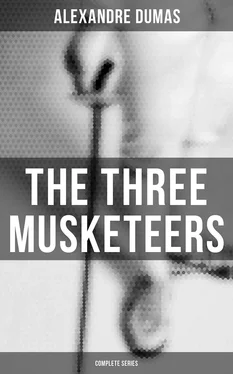MM. Bassompierre and Schomberg were marshals of France, and claimed their right of commanding the army under the orders of the king; but the cardinal, who feared that Bassompierre, a Huguenot at heart, might press but feebly the English and Rochellais, his brothers in religion, supported the Duc d’Angouleme, whom the king, at his instigation, had named lieutenant general. The result was that to prevent MM. Bassompierre and Schomberg from deserting the army, a separate command had to be given to each. Bassompierre took up his quarters on the north of the city, between Leu and Dompierre; the Duc d’Angouleme on the east, from Dompierre to Perigny; and M. de Schomberg on the south, from Perigny to Angoutin.
The quarters of Monsieur were at Dompierre; the quarters of the king were sometimes at Estree, sometimes at Jarrie; the cardinal’s quarters were upon the downs, at the bridge of La Pierre, in a simple house without any entrenchment. So that Monsieur watched Bassompierre; the king, the Duc d’Angouleme; and the cardinal, M. de Schomberg.
As soon as this organization was established, they set about driving the English from the Isle.
The juncture was favorable. The English, who require, above everything, good living in order to be good soldiers, only eating salt meat and bad biscuit, had many invalids in their camp. Still further, the sea, very rough at this period of the year all along the sea coast, destroyed every day some little vessel; and the shore, from the point of l’Aiguillon to the trenches, was at every tide literally covered with the wrecks of pinnacles, roberges, and feluccas. The result was that even if the king’s troops remained quietly in their camp, it was evident that some day or other, Buckingham, who only continued in the Isle from obstinacy, would be obliged to raise the siege.
But as M. de Toiras gave information that everything was preparing in the enemy’s camp for a fresh assault, the king judged that it would be best to put an end to the affair, and gave the necessary orders for a decisive action.
As it is not our intention to give a journal of the siege, but on the contrary only to describe such of the events of it as are connected with the story we are relating, we will content ourselves with saying in two words that the expedition succeeded, to the great astonishment of the king and the great glory of the cardinal. The English, repulsed foot by foot, beaten in all encounters, and defeated in the passage of the Isle of Loie, were obliged to re-embark, leaving on the field of battle two thousand men, among whom were five colonels, three lieutenant colonels, two hundred and fifty captains, twenty gentlemen of rank, four pieces of cannon, and sixty flags, which were taken to Paris by Claude de St. Simon, and suspended with great pomp in the arches of Notre Dame.
Te Deums were chanted in camp, and afterward throughout France.
The cardinal was left free to carry on the siege, without having, at least at the present, anything to fear on the part of the English.
But it must be acknowledged, this response was but momentary. An envoy of the Duke of Buckingham, named Montague, was taken, and proof was obtained of a league between the German Empire, Spain, England, and Lorraine. This league was directed against France.
Still further, in Buckingham’s lodging, which he had been forced to abandon more precipitately than he expected, papers were found which confirmed this alliance and which, as the cardinal asserts in his memoirs, strongly compromised Mme. de Chevreuse and consequently the queen.
It was upon the cardinal that all the responsibility fell, for one is not a despotic minister without responsibility. All, therefore, of the vast resources of his genius were at work night and day, engaged in listening to the least report heard in any of the great kingdoms of Europe.
The cardinal was acquainted with the activity, and more particularly the hatred, of Buckingham. If the league which threatened France triumphed, all his influence would be lost. Spanish policy and Austrian policy would have their representatives in the cabinet of the Louvre, where they had as yet but partisans; and he, Richelieu—the French minister, the national minister—would be ruined. The king, even while obeying him like a child, hated him as a child hates his master, and would abandon him to the personal vengeance of Monsieur and the queen. He would then be lost, and France, perhaps, with him. All this must be prepared against.
Courtiers, becoming every instant more numerous, succeeded one another, day and night, in the little house of the bridge of La Pierre, in which the cardinal had established his residence.
There were monks who wore the frock with such an ill grace that it was easy to perceive they belonged to the church militant; women a little inconvenienced by their costume as pages and whose large trousers could not entirely conceal their rounded forms; and peasants with blackened hands but with fine limbs, savoring of the man of quality a league off.
There were also less agreeable visits—for two or three times reports were spread that the cardinal had nearly been assassinated.
It is true that the enemies of the cardinal said that it was he himself who set these bungling assassins to work, in order to have, if wanted, the right of using reprisals; but we must not believe everything ministers say, nor everything their enemies say.
These attempts did not prevent the cardinal, to whom his most inveterate detractors have never denied personal bravery, from making nocturnal excursions, sometimes to communicate to the Duc d’Angouleme important orders, sometimes to confer with the king, and sometimes to have an interview with a messenger whom he did not wish to see at home.
On their part the Musketeers, who had not much to do with the siege, were not under very strict orders and led a joyous life. The was the more easy for our three companions in particular; for being friends of M. de Treville, they obtained from him special permission to be absent after the closing of the camp.
Now, one evening when d’Artagnan, who was in the trenches, was not able to accompany them, Athos, Porthos, and Aramis, mounted on their battle steeds, enveloped in their war cloaks, with their hands upon their pistol butts, were returning from a drinking place called the Red Dovecot, which Athos had discovered two days before upon the route to Jarrie, following the road which led to the camp and quite on their guard, as we have stated, for fear of an ambuscade, when, about a quarter of a league from the village of Boisnau, they fancied they heard the sound of horses approaching them. They immediately all three halted, closed in, and waited, occupying the middle of the road. In an instant, and as the moon broke from behind a cloud, they saw at a turning of the road two horsemen who, on perceiving them, stopped in their turn, appearing to deliberate whether they should continue their route or go back. The hesitation created some suspicion in the three friends, and Athos, advancing a few paces in front of the others, cried in a firm voice, “Who goes there?”
“Who goes there, yourselves?” replied one of the horsemen.
“That is not an answer,” replied Athos. “Who goes there? Answer, or we charge.”
“Beware of what you are about, gentlemen!” said a clear voice which seemed accustomed to command.
“It is some superior officer making his night rounds,” said Athos. “What do you wish, gentlemen?”
“Who are you?” said the same voice, in the same commanding tone. “Answer in your turn, or you may repent of your disobedience.”
“King’s Musketeers,” said Athos, more and more convinced that he who interrogated them had the right to do so.
“What company?”
“Company of Treville.”
Читать дальше












